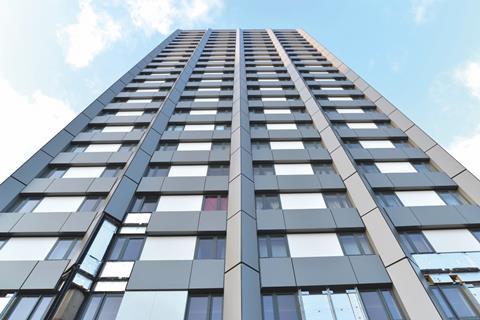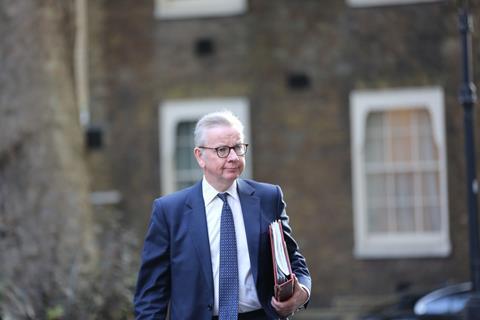But housing secretary says construction-industry players have greater culpability in 2017 tragedy

Housing secretary Michael Gove has admitted that the government’s building-safety system was “faulty and ambiguous” in the years before 2017’s Grenfell Tower fire in a clear statement of the role the government played in the tragedy, which claimed 72 lives.
Gove’s comments follow more understated acknowledgements from the Department for Levelling Up, Housing, and Communities at the Grenfell Tower Inquiry. They came ahead of today’s launch of new contracts that demand housebuilders fix fire safety defects in their blocks or face a ban on developing future schemes – event those that already have planning permission.
Gove said that the government did not think hard enough or police effectively enough “the whole system of building safety” before the west London tower-block fire in 2017. The fire was fuelled by highly combustible cladding and insulation fitted to the 1970s building’s exterior in a botched refurbishment.
Hundreds of high-rise buildings, and thousands of medium-rise buildings have subsequently been found to have been built, or upgraded, with unsafe materials.
In a Sunday Times interview published yesterday, Gove said the government had played a role in the industry-wide failings that led to the 2017 fire.
“There was a system of regulation that was faulty. The government did not think hard enough, or police effectively enough, the whole system of building safety. Undoubtedly,” the secretary of state said.
“I believe that [the guidance] was so faulty and ambiguous that it allowed unscrupulous people to exploit a broken system in a way that led to tragedy.”
However Gove made a distinction between the role of the government and the role of construction-industry product manufacturers, who marketed materials as being compliant with building regulations when they were not.

“The inquiry, I think, will allocate responsibility appropriately,” Gove said. “There are sins of omission and sins of commission. There’s neglect and a failure to effectively get the system in place, which is one thing. And then there is an active willingness to put people in danger in order to make a profit, which to my mind is a significantly greater sin.”
In his closing statement to the Grenfell Tower Inquiry’s phase two hearings last year, DLUHC counsel Jonathan Beer KC said the department recognised it had “failed to appreciate” it held an “important stewardship role” over the building safety regime, which had been “broken”.
“As a result it failed to grasp the opportunities to assess whether the system was working as intended,” Beer said.
Inquiry lead counsel Richard Millett KC suggested DLUHC had attempted to play down its own failings, and how they could be linked to the failings within the construction sector.
The Grenfell Tower Inquiry panel is currently working on its phase-two report.
Today DLUHC has published the contract that will give legal force to housebuilders’ pledge to fix ”life-critical” fire safety defects on their own blocks going back 30 years.
Negotiations have been ongoing about the wording of the contract since last summer, with housebuilders initially warning that it would leave them open to costs for works that go beyond ”life-critical defects”.
A letter to housebuilders from Richard Goodman, director general for building safety at DLUHC, said Gove expects housebuilders to sign the new version of the contract by 13 March.
If they do not do so they face a ban on “commencing developments for which they have planning permission, and from receiving building control approval for construction that is underway.” The government confirmed it will set up a Responsible Actors scheme in the spring, using powers under the Building Safety Act, to enable it to do this.
The letter also said developers failing to sign the contract, “should expect that fact to be public” with the department informing “investors and customers of the risks arising from continuing their commercial relationships” with the developer.
Gove said “there will be nowhere to hide” for those who “fail to step up to their responsibilities.”
He said: “Too many developers, along with product manufacturers and freeholders, have profited from these unsafe buildings and have a moral duty to do the right thing and pay for their repair.
“In signing this contract, developers will be taking a big step towards restoring confidence in the sector and providing much needed certainty to all concerned.”
A total of 49 developers have signed the developer pledge and are expected to commit more than £2bn on fixing defects to buildings that are above 11 metres in height.
















1 Readers' comment